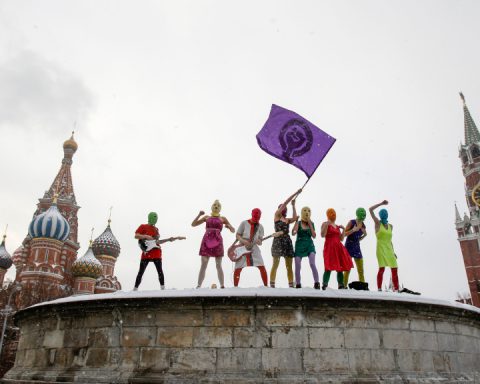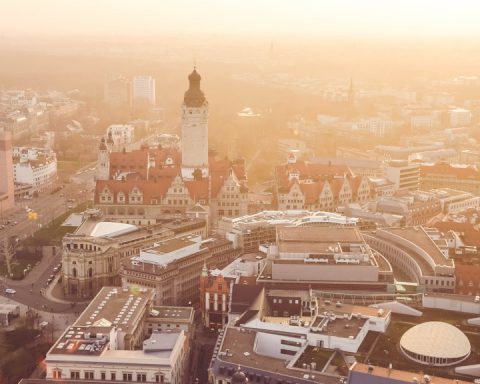Editor’s note: Media freedom seems to be in a deepening crisis with the expanding reach of the Internet. It’s a channel which is, of course, harder for authoritarian governments to control than traditional press and media. But they surely try to exert such control, with increasingly oppressive measures. This article on Belarus is the first in a series LeipGlo is running on the matter of repression of the media in different countries. The author first submitted a version of this article as an essay to her Master’s course entitled “Media Systems in the EU, US and PR China in a Comparative Perspective,” taught by Maria Faust at Uni Leipzig last semester. She received top marks.
—
Belarus is one of the post-Soviet countries where the government tries to exert total control over all spheres of life. No wonder it was labeled “Europe’s last dictatorship.”

It’s a country with strong state ideology, based on Soviet times and now localized to the current reality, the independent state. That means a focus on the hegemony of the state, and non-criticism of its leader and government and system in general.
President Aleksandr Lukashenko has been ruling the state since 1994 and positions himself as a guarantor of state stability. Promotion of this idea is integrated into mass media, which are subordinated by the state.
Belorussian policy is based on the idea of the unique role of the state, as well as non-conformity to Western states and their influence. As a result, contempt of a government official is a criminal offense; the most serious crimes within this are libel and contempt of the country’s president, which is punishable by up to five years in prison.
This seriously limits the country’s media environment, including online.
For instance, in 2007, opposition politician Andrei Klimov was sentenced to two years in prison for materials containing criticism of the President published on the Internet. Mainly, however, blocking and filtering, content manipulation and breaking into the personal accounts of independent journalists, opposition leaders, and social activists are the techniques Belorussian authorities use to achieve Internet censorship.
According to Index on Censorship, independent media is under constant threat of repression by the country’s authorities. In recent years, there were frequent cases of searches in the offices of non-government media and journalists’ homes. Also, journalists have been detained and their equipment damaged while covering street protests by the opposition.
Articles of the Criminal Code – providing for liability for slander and insult – have been repeatedly applied to journalists who write about high-ranking government officials, including the Belarus president. In addition, there have been accreditation issues and harassment of journalists who cooperate with foreign media.
The Internet could become an alternative platform for independent journalists, opposition leaders and social activists to circumvent restrictions. However, this has not quite been the case.
In Belarus, the government is the sole owner of the backbone connection to the Internet.
Only two institutions – Beltelecom and the National Center for Traffic Exchange – are allowed to handle connections with Internet service providers outside of Belarus. As the companies are state-owned, the authorities possess deep control capabilities. Although commercial Internet providers do exist, they must purchase Internet access from Beltelecom.
But despite tight governmental control, the Belorussian informational space has become amenable to external influence. Russian companies have grown into strong players in the Belorussian market.

Largely, this has been possible because Belorussians can speak Russian, and the Internet in Russia is much more developed. Three out of the five most popular websites in Belarus are Russian, including the social network vk.com and the portal mail.ru.
Controversially, during the Ukrainian revolution (2013-14), the hand of Russian authorities reached in to block access to Ukrainian websites being accessed from Belorussian territory.
Meanwhile, Belorussian state policy supports Internet service being spread all over the country; the number of the country’s Internet users is relatively high and is increasing. However, widespread access does not mean free usage.
Information about the outside world has to be given in a certain way that will not affect state stability or prestige.
In 2010, the president issued decree №60, “On Measures to Improve the Use of the National Segment of the Internet,” which legalizes the use of the state surveillance system on the Internet to make search operations possible. It grants the Ministry of Information the right to monitor Internet resources and to issue warnings. It can also now block Internet resources without adjudication, prohibit promotional activities for mass media, and terminate licenses.
The ministry can restrict access to a website if it has gotten two warnings during one year, and the law does not set out procedures for appealing the decision. According to the Belorussian Association of Journalists, between January and June 2016, the Ministry of Information issued 12 warnings: eight to the media and four to information resources.
The decree also introduced “restricted access lists” – featuring websites whose access is closed for public computers (from educational institutions, Internet cafes and other public and government agencies).

The main issue in Belarus is not the availability of Internet access: it is people’s inability to use the Internet freely, without any limitations or intervention by the government. Their rights to freedom of speech and self-expression are not respected.
Taking into account processes such as globalization and the development of communication technologies, happening ever faster, it’s easy to foresee future difficulties for the Belorussian censorship machine. Like with Russian influence, it will be increasingly hard to control, and related anxiety at the state level can bring further crackdowns and limitations to democracy.
By Kateryna Zavgorodnia
—

Kateryna is a second year MA student at the University of Wroclaw, Poland, after having studied in Leipzig. She has Slavic origin, which gives her a good understanding of the region and people’s mentality. At the same time, education in the field of international relations and almost two years living in the European Union have enabled her to think critically about issues such as state governance, power and freedom. She has a special interest in the role of the Internet in current international relations and cyber security.






